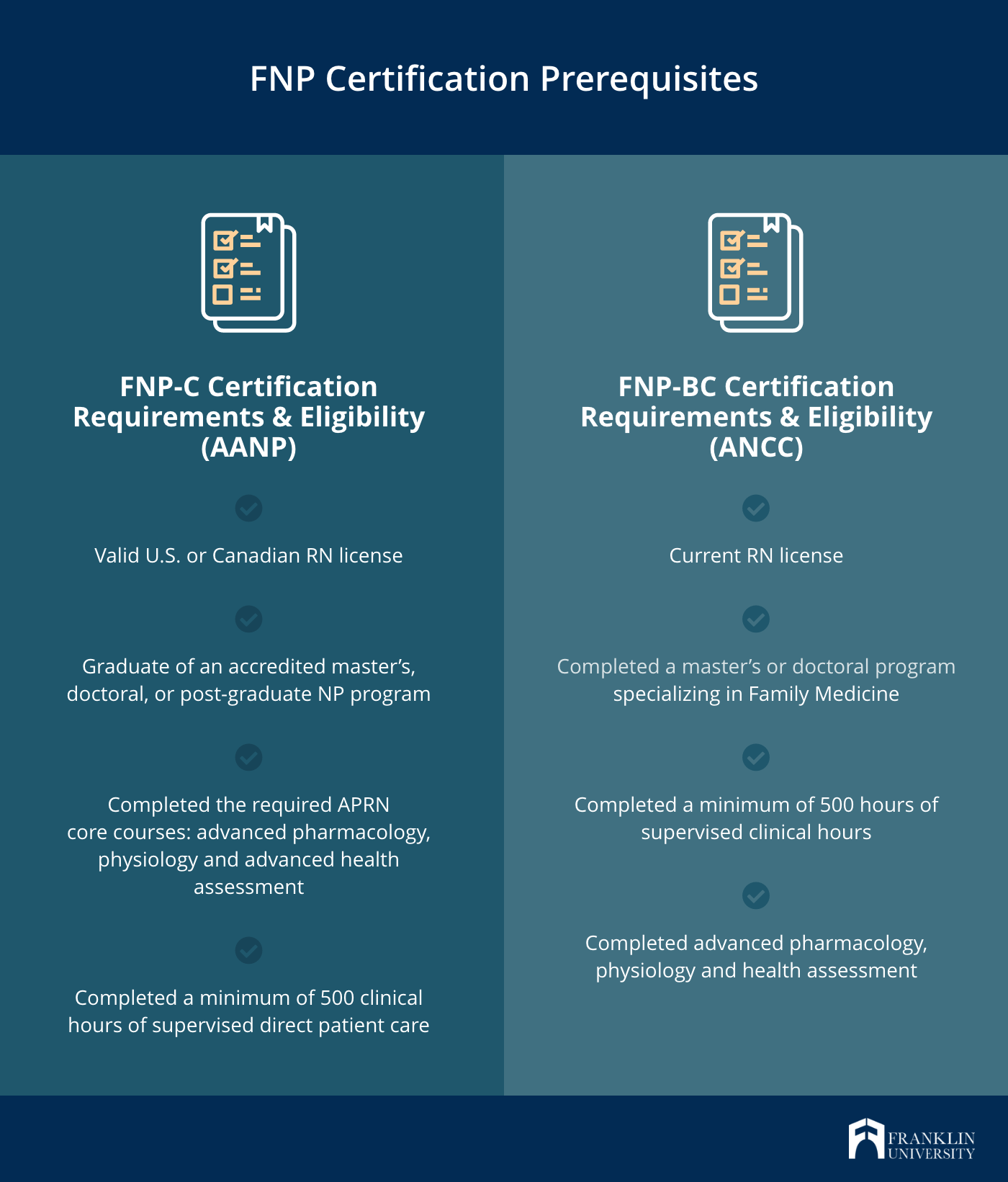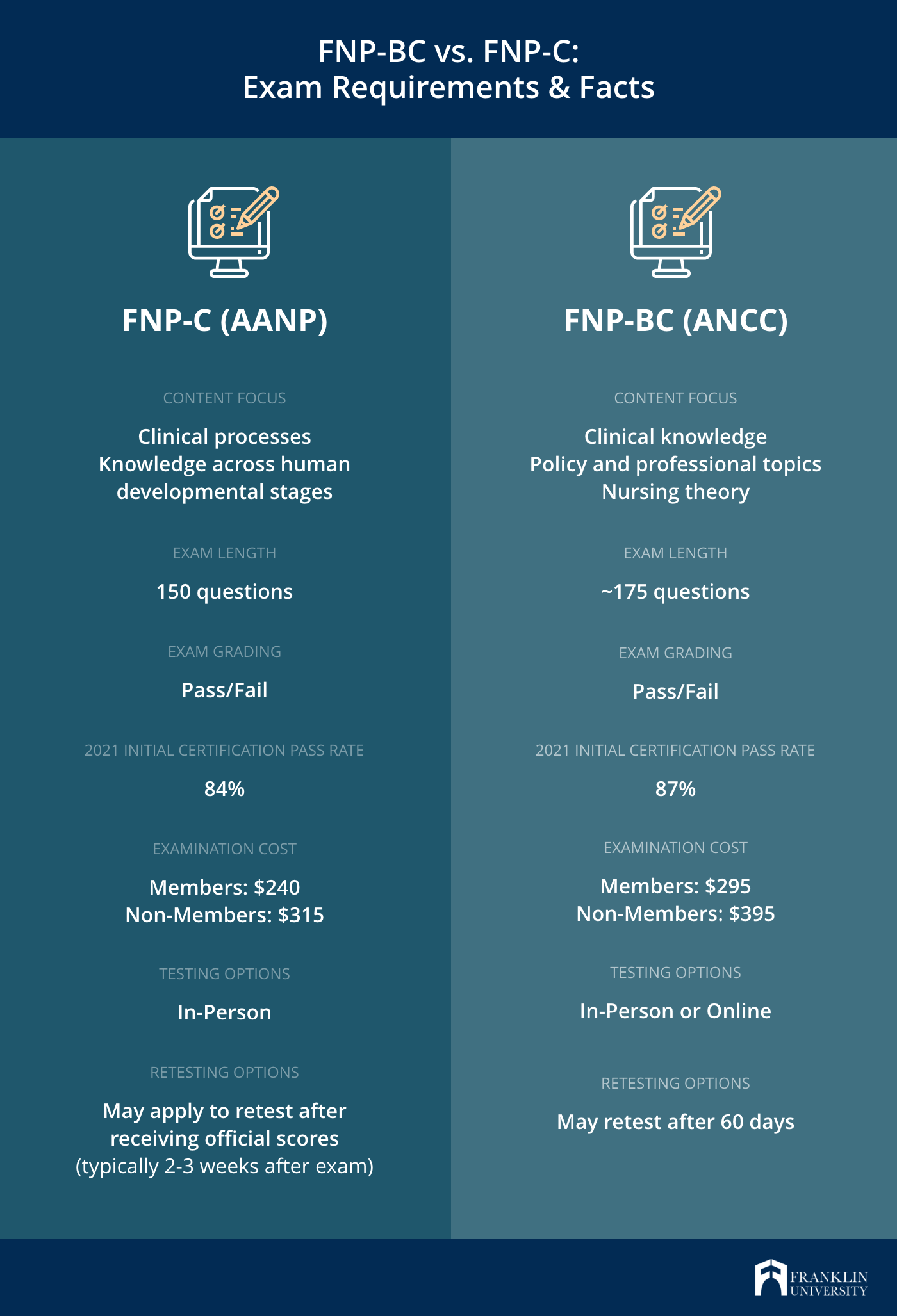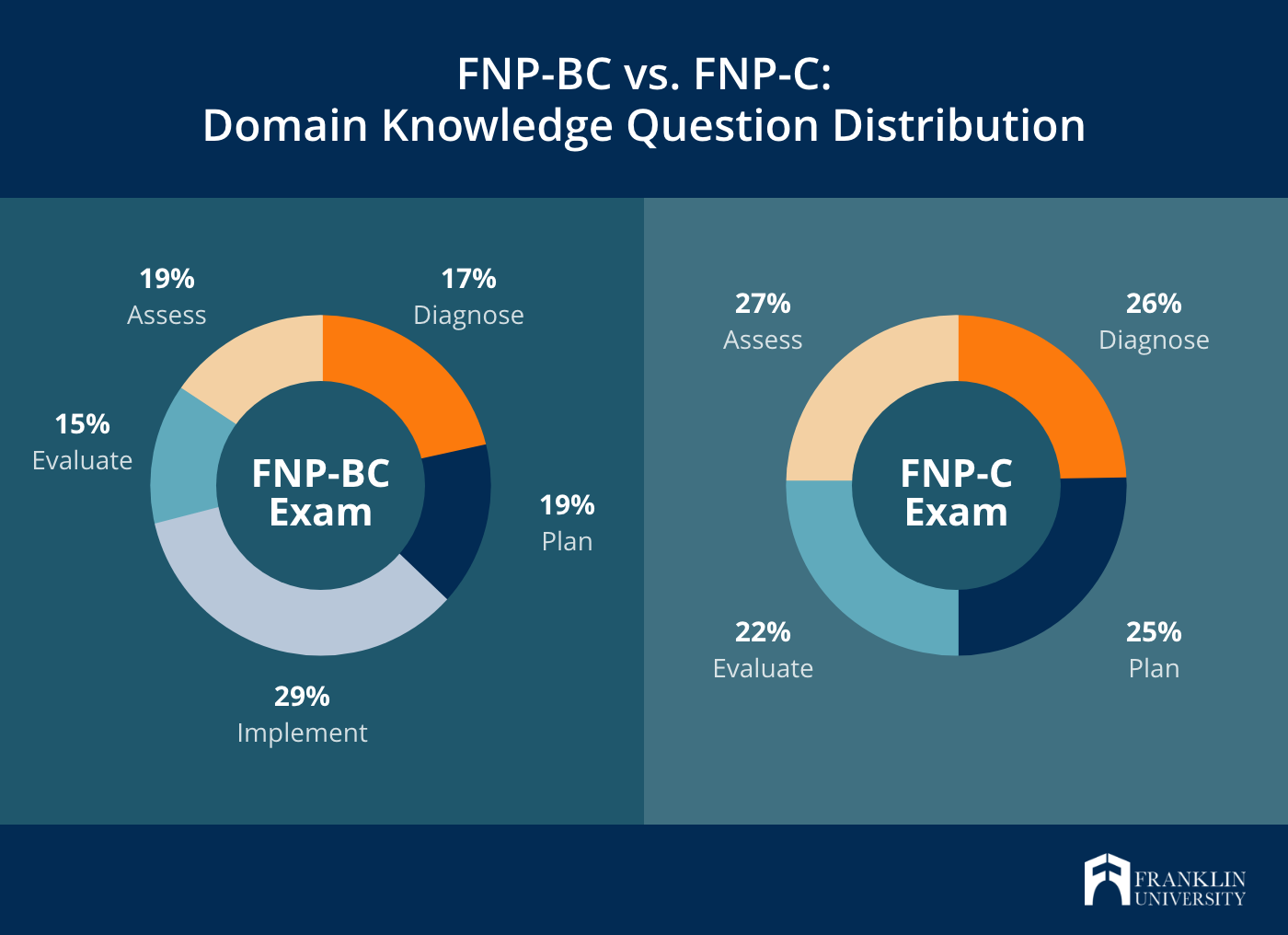Request Information
We're Sorry
There was an unexpected error with the form (your web browser was unable to retrieve some required data from our servers). This kind of error may occur if you have temporarily lost your internet connection. If you're able to verify that your internet connection is stable and the error persists, the Franklin University Help Desk is available to assist you at helpdesk@franklin.edu, 614.947.6682 (local), or 1.866.435.7006 (toll free).
Just a moment while we process your submission.

FNP Certification: 6 Big Questions Answered for Aspiring Family Nurse Practitioners
According to the Bureau of Labor Statistics, the need for advanced practice nurses is projected to grow 45% from 2020 to 2030. That is astounding growth that can serve as an opportunity for nurses to accelerate their careers.
Family nurse practitioner, or FNP, is a specialization within the nurse practitioner (NP) field. This advanced-practice nursing role focuses on patients at all stages of life—from infancy through adulthood. This versatility, combined with a nationwide physician shortage, make FNP one of the most common certifications chosen by NPs.
Today’s FNPs are helping to fill the gap to help meet the growing needs of patients, especially in primary care settings. For those willing to pursue advanced certification, the opportunities are endless. This article will serve as a comprehensive resource to help you understand the FNP certification process and how to prepare for success.
What is FNP Certification?
FNP certification is a board-certified credential that ensures entry-level clinical knowledge and skills of the FNP, which includes family and individual care across the lifespan—prenatal, pediatric, adolescent, adult, older adult, and elderly primary care.
FNP certifications must be renewed every five years in order to maintain their validity. The purpose of certification renewal is to ensure FNPs maintain professional competency based on the most current information and practices.
Is FNP Certification Necessary?
Most likely, yes. One of the primary reasons to earn FNP certification is that it’s often a prerequisite for state licensure as a nurse practitioner. However, this requirement varies by state.
In addition to licensure requirements, there are a number of other professional advantages to earning an FNP certification.
- Build Professional Credibility: An FNP certification proves competency within family medicine, which builds trust with prospective employers, physicians who may oversee a nurse practitioner and patients.
- Improve Job Prospects: Certification may give NPs, especially new NPs with less experience, an edge when applying for positions.
- Patient Safety & Outcomes: Required, ongoing continuing education ensures FNPs stay at the forefront of the industry and use the latest standards and skills for patient care practices.
What FNP Certifications are Available?
Choosing the correct certification is important. Select local and state agencies may offer certification for FNPs, but to prevent licensing issues down the line it’s best to choose a nationally recognized agency.
The two most prominent nationally recognized certifying agencies are the American Academy of Nurse Practitioners (AANP) and the American Nurses Credentialing Center (ANCC).
The AANP certification is called the FNP-C. The ANCC certification is referred to as the FNP-BC. These certifications are considered equivalent—neither is better than the other and both offer well-respected credentials. However, the content of the two tests varies slightly. Let’s look at which certification best aligns with your goals.
- The FNP-BC, places more emphasis on policy and professional topics, as well as nursing theory, so many who pursue careers in academia choose this certification.
- The FNP-C focuses primarily on clinical knowledge across the different developmental stages. This focus may result in patient care-focused nurses to pursue this examination.
However, these are not hard-and-fast rules. The most important factor in decision making is ensuring that the certification meets your state’s licensing standards.
Get a FREE guide to help you advance your career, featuring helpful advice and thoughtful insights from nursing experts.
How Do You Earn FNP Certification?
FNP certification is earned by meeting specific education, experience and professional criteria, in addition to passing an exam. The requirements to qualify to take the exam vary slightly by certifying agency. Let’s look at the specific requirements for both the FNP-C and the FNP-BC.

After completing the application process and providing documentation to show you meet all requirements, you will pay an application/examination fee. Next, we’ll review what to expect when taking your chosen certification exam.
What You Can Expect from an FNP Certification Exam?
FNP certification exams are competency-based exams that test clinical knowledge in a family/individual across the lifespan. The two primary FNP certification exams are similar, but not identical. Let’s compare the major components of each exam so you know what to expect in either scenario.

The content of both exams focuses on testing domain knowledge that reflects the components of the FNP role, which include:
- Assess: Tests knowledge of evidence-based population health promotion and screening.
- Diagnose: Tests pathogenesis and clinical manifestations of disease states.
- Plan: Tests age-appropriate prevention; evidence-based clinical guidelines; standards of care; and pharmacotherapeutics.
- Implement (FNP-BC Exam Only): Tests legal and ethical implications; nonpharmacologic intervention and treatment selection; regulatory guidelines; and APRN scope and standards.
- Evaluate: Tests ethical and legal principles and issues for patients, populations, and systems; nonpharmacologic intervention and treatment outcomes; and pharmacotherapeutic intervention and treatment outcomes.
Let’s look at the emphasis each exam places on the different domain knowledge based on question distribution.

As you can see the FNP-BC places a greater emphasis on policy, regulation and nursing theory, while the FNP-C focuses solely on clinical application of knowledge.
If you have more questions about the exam or requirements, you can review the FAQs for the AANP FNP-C certification or the resources provided by the ANCC for the FNP-BC certification.
Tips to Prepare for an FNP Certification Exam
Preparing for the FNP Certification Exam takes time, practice and dedication. Here are five pieces of expert advice for how to effectively prepare for the FNP certification exam.
- Take advantage of free resources: Both the AANP and ANCC offer free resources to help prospective FNPs prepare for the exam. From test content outline to test reference lists and sample questions and exams, there are a wealth of resources to help you study.
- Develop a personal study plan: About six months prior to the exam, you should create a study plan that works for you and your schedule. Block out time on your calendar–about an hour at a time—to dedicate to studying.
- Try different study methods: Everyone is different. Figure out what type of learning methods work best for you—whether that’s independent study, reviewing textbooks, watching videos or joining a study group.
- Be realistic: You can’t expect to know everything about all the domains. Use the percentage and number of questions in each category to help you concentrate your areas of focus.
And finally, relax: Be confident in your knowledge and go into the test knowing that you have done everything you can to prepare and succeed.
Choose the Degree Right Program to Prepare for FNP Certification
Your education is the foundation of the knowledge you need to pass the FNP certification exam. Look for degree or postgraduate certificates that specialize in family practice and offer tailored curriculum that will prepare you for FNP certification.
Franklin University offers online MSN-FNP, DNP-FNP and FNP Certificate programs that will prepare you for an advanced clinical role as an FNP. With higher than average pass rates for the FNP certificate exam, Franklin's industry-standard curriculum taught by experienced practitioners helps students succeed.
Learn more about Franklin’s MSN-FNP, DNP-FNP and FNP Certificate programs to find the right path to achieve your goal of becoming an FNP.





